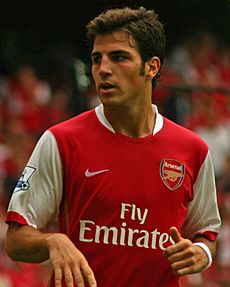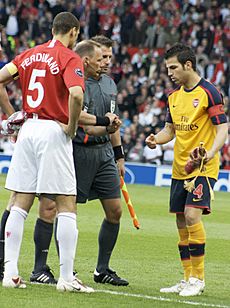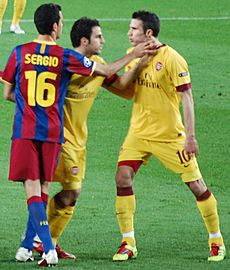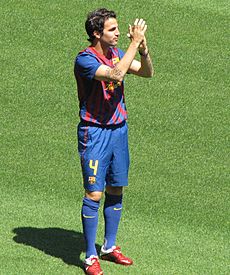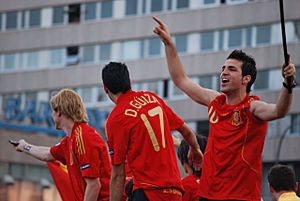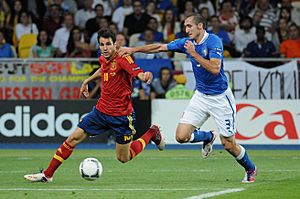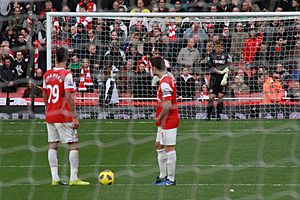Cesc Fàbregas facts for kids
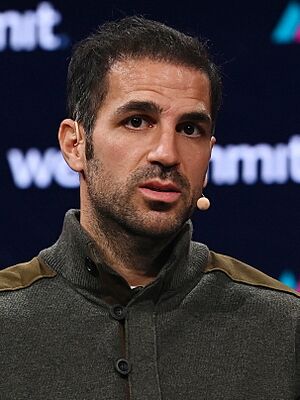
Fàbregas in 2023
|
||||||||||||||||||||||||||||||||||
| Personal information | ||||||||||||||||||||||||||||||||||
|---|---|---|---|---|---|---|---|---|---|---|---|---|---|---|---|---|---|---|---|---|---|---|---|---|---|---|---|---|---|---|---|---|---|---|
| Full name | Francesc Fàbregas Soler | |||||||||||||||||||||||||||||||||
| Date of birth | 4 May 1987 | |||||||||||||||||||||||||||||||||
| Place of birth | Arenys de Mar, Spain | |||||||||||||||||||||||||||||||||
| Height | 1.79 m (5 ft 10 in) | |||||||||||||||||||||||||||||||||
| Position(s) | Central midfielder | |||||||||||||||||||||||||||||||||
| Team information | ||||||||||||||||||||||||||||||||||
|
Current team
|
Como (head coach) | |||||||||||||||||||||||||||||||||
| Youth career | ||||||||||||||||||||||||||||||||||
| 1995–1997 | Mataró | |||||||||||||||||||||||||||||||||
| 1997–2003 | Barcelona | |||||||||||||||||||||||||||||||||
| 2003 | Arsenal | |||||||||||||||||||||||||||||||||
| Senior career* | ||||||||||||||||||||||||||||||||||
| Years | Team | Apps | (Gls) | |||||||||||||||||||||||||||||||
| 2003–2011 | Arsenal | 212 | (35) | |||||||||||||||||||||||||||||||
| 2011–2014 | Barcelona | 96 | (28) | |||||||||||||||||||||||||||||||
| 2014–2019 | Chelsea | 138 | (15) | |||||||||||||||||||||||||||||||
| 2019–2022 | Monaco | 54 | (3) | |||||||||||||||||||||||||||||||
| 2022 | Monaco B | 1 | (0) | |||||||||||||||||||||||||||||||
| 2022–2023 | Como | 17 | (0) | |||||||||||||||||||||||||||||||
| Total | 518 | (81) | ||||||||||||||||||||||||||||||||
| International career | ||||||||||||||||||||||||||||||||||
| 2002–2003 | Spain U16 | 8 | (0) | |||||||||||||||||||||||||||||||
| 2003–2004 | Spain U17 | 14 | (7) | |||||||||||||||||||||||||||||||
| 2005 | Spain U20 | 5 | (0) | |||||||||||||||||||||||||||||||
| 2004–2005 | Spain U21 | 12 | (8) | |||||||||||||||||||||||||||||||
| 2006–2016 | Spain | 110 | (15) | |||||||||||||||||||||||||||||||
| Managerial career | ||||||||||||||||||||||||||||||||||
| 2023 | Como (interim) | |||||||||||||||||||||||||||||||||
| 2024– | Como | |||||||||||||||||||||||||||||||||
|
Medal record
|
||||||||||||||||||||||||||||||||||
| *Club domestic league appearances and goals | ||||||||||||||||||||||||||||||||||
Francesc "Cesc" Fàbregas Soler (born May 4, 1987) is a Spanish professional football manager and former player. He played as a central midfielder and is now the head coach of the Italian club Como.
Fàbregas started his football journey at La Masia, Barcelona's famous youth academy. At 16, he moved to the English club Arsenal in September 2003. He quickly became a key player, breaking club records and winning the FA Cup in 2005. His great performances earned him spots in the UEFA Team of the Year and PFA Team of the Year twice.
In August 2011, Fàbregas returned to Barcelona. During his three years there, he played alongside stars like Xavi and Andrés Iniesta. He won a La Liga title, the Copa del Rey, the FIFA Club World Cup, and other major trophies.
He came back to London in June 2014, joining Arsenal's rivals Chelsea. At Chelsea, he won the Premier League twice, the League Cup, the FA Cup, and the UEFA Europa League. In January 2019, he moved to Ligue 1 club Monaco. Fàbregas retired from playing in 2023 after playing one year for Como in Italy.
For the Spanish national team, Fàbregas made his debut in March 2006. He played in three World Cups (2006, 2010, 2014) and three European Championships (2008, 2012, 2016). He was a vital part of Spain's wins in the European Championship in 2008 and 2012, and their World Cup victory in 2010. In the 2010 World Cup final, he provided the pass for Andrés Iniesta's winning goal. In October 2015, Fàbregas played his 100th game for Spain.
Contents
Early Football Days
Cesc Fàbregas was born in Arenys de Mar, Catalonia, Spain. He loved FC Barcelona from a young age, going to his first match when he was just nine months old with his grandfather.
He started his club football journey at CE Mataró. Then, at age ten in 1997, he joined Barcelona's famous La Masia youth academy. His first coach, Señor Blai, tried to limit his games against Barcelona so the club wouldn't notice him, but he eventually joined them. Fàbregas trained as a defensive midfielder alongside future stars like Gerard Piqué and Lionel Messi. He scored many goals at youth level, sometimes over 30 in a season, but he never played for Barcelona's main team at that time.
Club Career Highlights
Playing for Arsenal
Starting in England
Fàbregas felt he wouldn't get many chances at Barcelona, so he joined Premier League club Arsenal in September 2003. He was only 16. At first, it was tough in London, but he became friends with Spanish-speaking teammate Philippe Senderos, who helped him settle.
He made his first team debut for Arsenal on October 28, 2003, in a League Cup game. This made him Arsenal's youngest-ever first team player at 16 years and 177 days old. He then became the youngest goalscorer in Arsenal's history in a later League Cup match. Even though Arsenal won the league unbeaten in the 2003–04 season, Fàbregas didn't get a winner's medal because he didn't play in any league games.
He started playing more often in the 2004–05 season. After some key midfielders got injured, Fàbregas stepped up. He scored his first league goal against Blackburn Rovers, becoming Arsenal's youngest league goalscorer. He signed his first professional contract with Arsenal in September 2004. In the 2004–05 UEFA Champions League, he became the second-youngest goalscorer in the competition's history. He ended the season by winning his first trophy with Arsenal, the FA Cup, after beating Manchester United on penalties.
Becoming a Key Player
When Arsenal moved to the Emirates Stadium in 2006, Fàbregas was given the number 4 shirt, which was previously worn by Patrick Vieira. He played regularly in midfield with Gilberto Silva. He played 49 games in the 2005–06 season. People watched him closely because he was so young but played such an important role.
Fàbregas showed his skill in the Champions League against Real Madrid and Juventus. In the game against Juventus, he scored Arsenal's first goal and set up Thierry Henry for the second. He played in the Champions League Final against his old club Barcelona, but Arsenal lost 2-1.
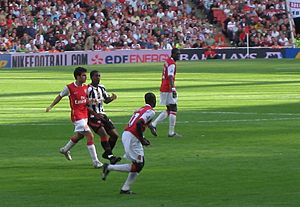
Real Madrid wanted to sign Fàbregas, but Arsenal manager Arsène Wenger said no. In October 2006, Fàbregas signed a new long-term contract with Arsenal. He said he loved Arsenal's playing style and Wenger.
The 2006–07 season was a learning year for Arsenal's young team. They didn't win any major trophies, losing to Chelsea in the League Cup Final. However, Fàbregas became one of the team's most creative players, playing in every league game. He scored two goals in a Champions League qualifier and made 13 assists in the Premier League. He won several awards, including the Golden Boy award and a spot in the 2006 UEFA Team of the Year. He was also named Arsenal's Player of the Season in June 2007.
The 2007–08 season started with changes for Arsenal. Their top goalscorer, Thierry Henry, left for Barcelona. Fàbregas knew he would become the most important player and was ready for it. He started the season very well, scoring goals and making assists. He won Arsenal's Player of the Month award for August, September, and October, and the Premier League Player of the Month for September. In the Champions League, he scored a late goal against Milan to send Arsenal to the quarter-finals. Even though Arsenal didn't win any trophies that season, Fàbregas won many personal awards. He was named the PFA Young Player of the Year and was included in the PFA Team of the Year. He was also Arsenal's Player of the Season again.
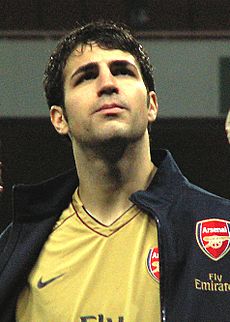
Becoming Captain
On November 24, 2008, Fàbregas was named Arsenal's new captain. This happened 14 league games into the 2008–09 season. Sadly, he got a knee injury against Liverpool and was out for four months. Arsenal finished fourth in the league and were knocked out of the Champions League semi-finals.
In the first league game of the 2009–10 season, Fàbregas scored two goals and made two assists in Arsenal's 6-1 win against Everton. Arsenal had a strong start, but then lost two league games. They bounced back and went unbeaten for 13 games, with Fàbregas scoring and assisting often. On March 31, 2010, in a Champions League game against Barcelona, Fàbregas broke his leg after scoring a goal. Arsenal lost their captain for the rest of the season and fell out of the league title race. Fàbregas was still named in the PFA Team of the Year.
Before the 2010–11 season, there was a lot of talk about Fàbregas leaving. Barcelona made a big offer, but Arsenal rejected it. The 2010–11 season was very competitive. Arsenal was fighting for the top spot but then lost in the League Cup final, were knocked out of the Champions League, and lost in the FA Cup quarter-finals.
Playing for Barcelona
2011–12 Season
On August 15, 2011, Barcelona signed Fàbregas. He had created many goal-scoring chances and made many assists during his time at Arsenal.
Fàbregas joined a very strong Barcelona team that had won many titles. He made his debut in the Supercopa de España against Real Madrid, which Barcelona won. He scored his first goal for Barcelona in a 2-0 win against Porto as Barcelona won the 2011 UEFA Super Cup. He scored his first league goal in his league debut, a 5-0 win over Villarreal.
He was out for most of October with a hamstring injury. When he returned, he scored in a Champions League game. He also scored two goals in a 5-0 win against Levante and a goal in a 3-1 win against Real Madrid. Fàbregas also scored against Brazilian club Santos to help Barcelona win the 2011 FIFA Club World Cup final 4-0.
Fàbregas scored two more goals in the Copa del Rey against Osasuna. He played regularly for Barcelona for the rest of the season. He ended his first season at Barcelona by winning the Copa del Rey, Spanish Super Cup, UEFA Super Cup, and FIFA Club World Cup. He scored 15 goals and made 20 assists in 48 games.
2012–13 Season
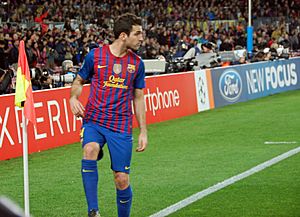
Fàbregas scored his first league goals of the season with two goals against Sevilla in a 3-2 win on September 29. He scored three more goals in October in different competitions. On April 6, 2013, Fàbregas scored his first hat-trick (three goals in one game) against Mallorca in a 5-0 victory.
He finished his second season at Barcelona by winning his first league title with a record 100 points. Barcelona was knocked out of the Copa del Rey and the Champions League semi-finals. Fàbregas ended the season with 14 goals and 12 assists in 48 games.
2013–14 Season
Barcelona started the season by winning the Spanish Super Cup. In the first league game on August 18, Fàbregas made five assists in a 7-0 win over Levante. He scored 8 goals in 36 league matches, including two goals in wins against Granada and Getafe. He also scored the only goal in a Champions League group stage game against Celtic on October 1.
Playing for Chelsea
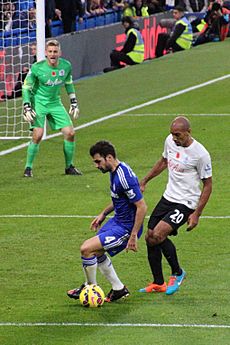
On June 12, 2014, Chelsea signed Fàbregas on a five-year contract. He took the number 4 shirt. Fàbregas said he asked Barcelona to let him leave because he wanted to be happy both professionally and personally at Chelsea.
2014–15 Season
Fàbregas played his first game for Chelsea on August 18 against Burnley. He played the whole game and made two assists in a 3-1 win. On September 13, 2014, he made two more assists in a 4-2 win over Swansea City. This made him the first player in Premier League history to have at least one assist in six games in a row. Four days later, he scored his first goal for Chelsea in a Champions League game against Schalke 04.
His first league goal for Chelsea came on October 18 in a 2-1 win at Crystal Palace. On December 10, he scored a penalty in a 3-1 Champions League win over Sporting CP. Twelve days later, he scored another league goal against Stoke.
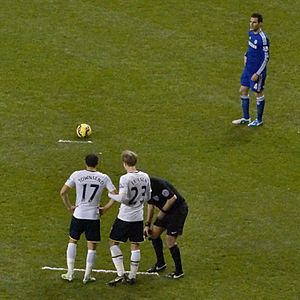
On May 3, 2015, the day before his 28th birthday, Fàbregas won his first Premier League title with Chelsea after a 1-0 win over Crystal Palace.
2015–16 Season
Fàbregas scored his first goal of the season on September 16 as Chelsea beat Maccabi Tel Aviv 4-0 in the Champions League. His first league goal came in a 3-3 draw against Everton on January 15, 2016. He scored again in a 2-1 win against Southampton on February 27, 2016. On March 19, 2016, Fàbregas scored a free-kick and a penalty in a 2-2 draw against West Ham United. He scored Chelsea's last goal of the season from a penalty in a 1-1 draw against the new Premier League champions, Leicester City.
2016–17 Season
Fàbregas was linked with a move away from Chelsea after not starting the first league game. On August 20, 2016, he came on as a substitute against Watford and made an assist for Diego Costa, who scored the winning goal in a 2-1 victory. His first two goals of the season came in an EFL Cup game against Leicester City on September 20, both in extra time, helping Chelsea win 4-2.
After an injury, Fàbregas played for Chelsea's under-23 team on November 21, 2016, making two assists. He returned to league action on December 3, 2016, against Manchester City. He made a long pass to Diego Costa, who scored to equalize. On December 14, 2016, Fàbregas scored his first league goal of the season against Sunderland, helping Chelsea to their tenth league win in a row. On December 31, 2016, Fàbregas made his 100th Premier League assist in his 293rd game. He became the fastest player to reach this milestone.
On February 4, 2017, Fàbregas scored against his former club Arsenal. He did not celebrate the goal out of respect. On February 25, Fàbregas played his 300th Premier League game, scoring a goal and making an assist as Chelsea beat Swansea City 3-1. He also reached 102 assists in the Premier League, matching Frank Lampard as the league's second-highest assist provider of all time.
Later Seasons at Chelsea
In the 2017–18 season, Fàbregas played 49 games and scored three goals. Chelsea won the FA Cup against Manchester United. He passed the ball to Eden Hazard, who won a penalty and scored the only goal of the game.
On January 5, 2019, Fàbregas played his last game in English football, a 2-0 home win over Nottingham Forest in the FA Cup. He was emotional at the end of the game.
Playing for Monaco

On January 11, 2019, Fàbregas signed with Monaco until June 2022. He joined his former Arsenal teammate Thierry Henry, who was the manager. He made his debut two days later in a 1-1 draw against Marseille. On February 2, he scored his first goal in a 2-1 win against Toulouse.
Fàbregas was sent off in the first game of the 2019–20 Ligue 1 season. On November 20, 2020, Fàbregas scored the winning goal for Monaco in a 3-2 win over Paris Saint-Germain.
In the 2021–22 season, Fàbregas missed most of the games due to a hamstring injury. He tried to come back for the reserve team but got another injury. He was released from his contract in June 2022 but said he would not retire yet.
Playing for Como and Retirement
On August 1, 2022, Fàbregas joined Serie B club Como in Italy, signing a two-year contract. He made his debut 28 days later.
Fàbregas announced his retirement from playing football on July 1, 2023.
International Career
Youth Teams
Fàbregas played for Spain's youth teams before joining the senior squad. At the 2003 FIFA U-17 World Championship in Finland, he was the top scorer even though he played in midfield. He was also voted the Player of the Tournament. Spain finished second in that tournament. Fàbregas also played in the 2004 UEFA U-17 European Championship, where Spain also finished second. FIFA named him the Golden Player of that tournament.
Senior Team
In 2006, Fàbregas made his debut for the Spanish senior team in a friendly game against Ivory Coast. He became the youngest player to play for Spain in 70 years. He played well and helped Spain win 3-2.
2006 World Cup
On May 15, 2006, Fàbregas was chosen for Spain's 2006 FIFA World Cup squad. He came on as a substitute in Spain's first two group games and made an assist. He also started in Spain's third group game. He became the youngest player in Spanish history to play in a World Cup game. He was nominated for the Young Player of the World Cup award.
UEFA Euro 2008
In UEFA Euro 2008, Fàbregas wore the number 10 shirt. Even though he was mostly a substitute, he made a big impact. He scored his first international goal in Spain's 4-1 win over Russia and also made an assist. In the quarter-finals against Italy, Fàbregas scored the winning penalty in the penalty shootout. In the semi-finals, Spain beat Russia 3-0, with Fàbregas providing two assists. He started in the Final against Germany, which Spain won 1-0. This was Spain's first major title since 1964. Fàbregas was named in the Team of the Tournament.
2009 Confederations Cup
After being out with an injury, Fàbregas returned to the squad for the 2009 FIFA Confederations Cup. He scored his second international goal in a 5-0 win against New Zealand. In the semi-finals, Spain lost to the United States, ending their 15-game winning streak.
2010 World Cup
Fàbregas was part of Spain's squad for the 2010 FIFA World Cup. He didn't start any games but came on as a substitute in four matches. In the final against the Netherlands, Fàbregas set up the winning goal for Iniesta in extra time. This helped Spain win the World Cup for the first time ever.
UEFA Euro 2012
Fàbregas was chosen for Spain's squad for UEFA Euro 2012. He started in the first group game against Italy and scored the equalizer in a 1-1 draw. He then scored his second goal of the tournament in a 4-0 win against Ireland. In the semi-finals against Portugal, Fàbregas scored the winning penalty in the shootout. In the final against Italy, Fàbregas started and assisted David Silva for the first goal in Spain's 4-0 victory.
2013 Confederations Cup
Fàbregas was part of the squad for the 2013 Confederations Cup. He started two games and came on as a substitute once, assisting a goal in Spain's opening match against Uruguay. Spain won all their group matches. They reached the final after beating Italy in a penalty shootout, but lost 3-0 to hosts Brazil in the final.
2014 World Cup
Fàbregas was included in Spain's final squad for the World Cup. He made his debut in the tournament in the opening 1-5 loss to the Netherlands. He also played in the last group game against Australia.
UEFA Euro 2016
On March 31, 2015, Fàbregas was captain for Spain for the first time in a friendly game against the Netherlands. He earned his 100th cap on October 12, 2015, becoming the tenth Spaniard to do so. In that game, he won a penalty, but his shot was saved. He started all of Spain's matches at the finals, coming on as a substitute in the group games and playing the full game in the loss to Italy in the Round of 16.
2018 World Cup
Fàbregas was not chosen for the Spain squad for the 2018 FIFA World Cup. Instead, he joined the BBC as a football expert for the tournament.
Managerial Career
On July 1, 2023, after retiring from playing, Fàbregas was appointed head coach of Como's under-19 and B-teams. He earned his UEFA A coaching licence in 2023.
After the previous coach was dismissed on November 13, 2023, Fàbregas became the first-team head coach on a temporary basis. Since he didn't have a UEFA Pro coaching licence yet, he was allowed to coach for one month. On December 20, Como announced Osian Roberts as the new caretaker manager, with Fàbregas staying as an assistant. Fàbregas's last game as interim head coach was a 3-3 draw against Palermo on December 23.
Roberts helped Como move up in the league, and the club won automatic promotion to Serie A. Fàbregas remained an assistant. On July 19, 2024, after being accepted into the UEFA Pro coaching course, Fàbregas was officially appointed head coach of Como, signing a four-year contract.
Fàbregas's first game as permanent manager was an Italian Cup match against Sampdoria on August 11, 2024, which ended in a 1-1 draw and a loss on penalties. Eight days later, in his first Serie A game, Como lost 3-0 to Juventus. Fàbregas got his first win as Como manager on matchday 5 of the Serie A season, beating Atalanta 3-2 away from home.
After a 1-0 home win over Genoa, Fàbregas equaled Como's record of four Serie A wins in a row. Six days later, Como won their fifth game in a row by beating Parma 1-0 away. They then beat Cagliari 3-1, making it six wins in a row. This winning streak ended with a 1-1 draw against Hellas Verona, but the draw confirmed Como would finish 10th in Serie A, their best finish since 1987.
How He Played
At Arsenal
Fàbregas came to Arsenal as a young player to slowly develop. But he unexpectedly became Arsenal's main central midfielder because of many injuries in the 2004–05 season. He looked up to his teammate Patrick Vieira and his childhood hero Pep Guardiola. Some people thought he was too small and not aggressive enough compared to other Arsenal midfielders.
However, Fàbregas quickly became one of the most exciting young talents in football. He was known for his amazing passing and vision. He was like the "general" of Arsenal's team, bringing creativity and understanding of the game. He was the main player who created chances for Arsenal, making 16 assists in the 2006–07 season. Between 2006 and 2011, Fàbregas created more chances than any other player in the top leagues of England, Spain, Italy, Germany, and France.
Fàbregas also started taking charge of set pieces, like corners, free kicks, and penalties. After the 2007–08 season, he started scoring more goals, with 11 goals in his first 16 games. Throughout his time at Arsenal, Fàbregas played in different midfield roles, sometimes as a defensive midfielder, sometimes as a box-to-box player, and later as an attacking midfielder.
At Barcelona and Spain
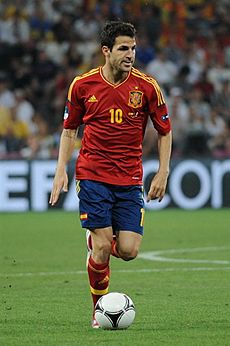
At Barcelona, Fàbregas continued to play a key midfield and playmaking role. He was part of the team's famous "tiki-taka" style of play, which involved patient, attacking passes. Because Barcelona had many great midfielders like Xavi, Sergio Busquets, and Andrés Iniesta, Fàbregas often played in different positions. He sometimes played as a supporting forward or even as a winger. He also often played as a "false-9" (a forward who drops deep to help in midfield), a role he also played for Spain at Euro 2012. Even though his time at Barcelona was successful, some people felt he wasn't always used in his best position.
At Chelsea
When Fàbregas returned to England with Chelsea, he went back to playing a playmaking role in midfield. He used his great technique, ball control, and vision to control the game. He often had defensive midfielders helping him, which gave him more space. In this deeper creative position, he was very good at providing assists. In his later seasons at Chelsea, Fàbregas often came off the bench to help the team control the midfield or create more attacking pressure.
Career Statistics
Club
| Club | Season | League | National Cup | League Cup | Europe | Other | Total | |||||||
|---|---|---|---|---|---|---|---|---|---|---|---|---|---|---|
| Division | Apps | Goals | Apps | Goals | Apps | Goals | Apps | Goals | Apps | Goals | Apps | Goals | ||
| Arsenal | 2003–04 | Premier League | 0 | 0 | 0 | 0 | 3 | 1 | 0 | 0 | 0 | 0 | 3 | 1 |
| 2004–05 | Premier League | 33 | 2 | 6 | 0 | 1 | 0 | 5 | 1 | 1 | 0 | 46 | 3 | |
| 2005–06 | Premier League | 35 | 3 | 0 | 0 | 1 | 0 | 13 | 1 | 1 | 1 | 50 | 5 | |
| 2006–07 | Premier League | 38 | 2 | 2 | 0 | 4 | 0 | 10 | 2 | — | 54 | 4 | ||
| 2007–08 | Premier League | 32 | 7 | 1 | 0 | 2 | 0 | 10 | 6 | — | 45 | 13 | ||
| 2008–09 | Premier League | 22 | 3 | 1 | 0 | 0 | 0 | 10 | 0 | — | 33 | 3 | ||
| 2009–10 | Premier League | 27 | 15 | 1 | 0 | 0 | 0 | 8 | 4 | — | 36 | 19 | ||
| 2010–11 | Premier League | 25 | 3 | 3 | 2 | 3 | 1 | 5 | 3 | — | 36 | 9 | ||
| 2011–12 | Premier League | 0 | 0 | 0 | 0 | 0 | 0 | 0 | 0 | — | 0 | 0 | ||
| Total | 212 | 35 | 14 | 2 | 14 | 2 | 61 | 17 | 2 | 1 | 303 | 57 | ||
| Barcelona | 2011–12 | La Liga | 28 | 9 | 8 | 3 | — | 9 | 1 | 3 | 2 | 48 | 15 | |
| 2012–13 | La Liga | 32 | 11 | 7 | 2 | — | 8 | 1 | 1 | 0 | 48 | 14 | ||
| 2013–14 | La Liga | 36 | 8 | 8 | 4 | — | 9 | 1 | 2 | 0 | 55 | 13 | ||
| Total | 96 | 28 | 23 | 9 | — | 26 | 3 | 6 | 2 | 151 | 42 | |||
| Chelsea | 2014–15 | Premier League | 34 | 3 | 1 | 0 | 4 | 0 | 8 | 2 | — | 47 | 5 | |
| 2015–16 | Premier League | 37 | 5 | 4 | 0 | 0 | 0 | 7 | 1 | 1 | 0 | 49 | 6 | |
| 2016–17 | Premier League | 29 | 5 | 6 | 0 | 2 | 2 | — | — | 37 | 7 | |||
| 2017–18 | Premier League | 32 | 2 | 4 | 0 | 4 | 0 | 8 | 1 | 1 | 0 | 49 | 3 | |
| 2018–19 | Premier League | 6 | 0 | 1 | 0 | 3 | 1 | 5 | 0 | 1 | 0 | 16 | 1 | |
| Total | 138 | 15 | 16 | 0 | 13 | 3 | 28 | 4 | 3 | 0 | 198 | 22 | ||
| Monaco | 2018–19 | Ligue 1 | 13 | 1 | 1 | 0 | 1 | 0 | — | — | 15 | 1 | ||
| 2019–20 | Ligue 1 | 18 | 0 | 2 | 0 | 2 | 0 | — | — | 22 | 0 | |||
| 2020–21 | Ligue 1 | 21 | 2 | 5 | 1 | — | — | — | 26 | 3 | ||||
| 2021–22 | Ligue 1 | 2 | 0 | 0 | 0 | 3 | 0 | — | 5 | 0 | ||||
| Total | 54 | 3 | 8 | 1 | 3 | 0 | 3 | 0 | — | 68 | 4 | |||
| Monaco B | 2021–22 | Championnat National 2 | 1 | 0 | — | — | — | — | 1 | 0 | ||||
| Como | 2022–23 | Serie B | 17 | 0 | 0 | 0 | — | — | — | 17 | 0 | |||
| Career total | 518 | 81 | 61 | 12 | 30 | 5 | 118 | 24 | 11 | 3 | 738 | 125 | ||
International
| National team | Year | Apps | Goals |
|---|---|---|---|
| Spain | 2006 | 14 | 0 |
| 2007 | 8 | 0 | |
| 2008 | 15 | 1 | |
| 2009 | 10 | 4 | |
| 2010 | 11 | 1 | |
| 2011 | 4 | 2 | |
| 2012 | 13 | 3 | |
| 2013 | 11 | 2 | |
| 2014 | 8 | 0 | |
| 2015 | 7 | 1 | |
| 2016 | 9 | 1 | |
| Total | 110 | 15 | |
- Scores and results list Spain's goal tally first, score column indicates score after each Fàbregas goal.
| No. | Date | Venue | Cap | Opponent | Score | Result | Competition |
|---|---|---|---|---|---|---|---|
| 1 | 10 June 2008 | Tivoli-Neu, Innsbruck, Austria | 27 | 4–1 | 4–1 | UEFA Euro 2008 | |
| 2 | 14 June 2009 | Royal Bafokeng Stadium, Phokeng, South Africa | 39 | 4–0 | 5–0 | 2009 FIFA Confederations Cup | |
| 3 | 9 September 2009 | Estadio Romano, Mérida, Spain | 44 | 1–0 | 3–0 | 2010 FIFA World Cup qualification | |
| 4 | 10 October 2009 | Vazgen Sargsyan Republican Stadium, Yerevan, Armenia | 45 | 1–0 | 2–1 | 2010 FIFA World Cup qualification | |
| 5 | 18 November 2009 | Ernst-Happel-Stadion, Vienna, Austria | 47 | 1–1 | 5–1 | Friendly | |
| 6 | 8 June 2010 | Estadio de La Condomina, Murcia, Spain | 50 | 4–0 | 6–0 | Friendly | |
| 7 | 2 September 2011 | AFG Arena, St. Gallen, Switzerland | 59 | 2–2 | 3–2 | Friendly | |
| 8 | 3–2 | ||||||
| 9 | 10 June 2012 | Stadion Energa Gdańsk, Gdańsk, Poland | 64 | 1–1 | 1–1 | UEFA Euro 2012 | |
| 10 | 14 June 2012 | Stadion Energa Gdańsk, Gdańsk, Poland | 65 | 4–0 | 4–0 | UEFA Euro 2012 | |
| 11 | 15 August 2012 | Juan Ramón Loubriel Stadium, Bayamón, Puerto Rico | 70 | 2–0 | 2–1 | Friendly | |
| 12 | 6 February 2013 | Khalifa International Stadium, Doha, Qatar | 76 | 1–0 | 3–1 | Friendly | |
| 13 | 8 June 2013 | Sun Life Stadium, Miami Gardens, United States | 79 | 2–0 | 2–1 | Friendly | |
| 14 | 11 June 2015 | Estadio Reino de León, Castile and León, Spain | 96 | 2–1 | 2–1 | Friendly | |
| 15 | 1 June 2016 | Red Bull Arena, Salzburg, Austria | 105 | 2–0 | 6–1 | Friendly |
Managerial Statistics
| Team | From | To | Record | |||||||
|---|---|---|---|---|---|---|---|---|---|---|
| M | W | D | L | GF | GA | GD | Win % | |||
| Como (interim) | 13 November 2023 | 20 December 2023 | 5 | 3 | 1 | 1 | 5 | 4 | +1 | 60.00 |
| Como | 16 July 2024 | present | 38 | 13 | 10 | 15 | 49 | 52 | −3 | 34.21 |
| Total | 43 | 16 | 11 | 16 | 54 | 56 | −2 | 37.21 | ||
Trophies and Awards
Player
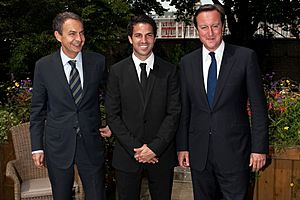
Arsenal
- FA Cup: 2004–05
- FA Community Shield: 2004
- Football League Cup runner-up: 2006–07
- UEFA Champions League runner-up: 2005–06
Barcelona
- La Liga: 2012–13
- Copa del Rey: 2011–12
- Supercopa de España: 2011, 2013
- UEFA Super Cup: 2011
- FIFA Club World Cup: 2011
Chelsea
- Premier League: 2014–15, 2016–17
- FA Cup: 2017–18; runner-up: 2016–17
- Football League Cup: 2014–15
- UEFA Europa League: 2018–19
Monaco
- Coupe de France runner-up: 2020–21
Spain
Individual Awards
- FIFA U-17 World Championship Golden Ball: 2003
- FIFA U-17 World Championship Golden Shoe: 2003
- UEFA European Under-17 Football Championship Golden Player: 2004
- Bravo Award: 2006
- Golden Boy: 2006
- UEFA Team of the Year: 2006, 2008
- Premier League Player of the Month: January 2007, September 2007
- Arsenal Player of the Season: 2006–07, 2009−10
- PFA Young Player of the Year: 2007–08
- PFA Team of the Year: 2007–08 Premier League, 2009–10 Premier League
- ESM Team of the Year: 2007–08, 2009–10, 2014–15
- UEFA European Championship Team of the Tournament: 2008, 2012
- FIFA FIFPro World XI 5th team: 2014
Orders
- Prince of Asturias Awards: 2010
- Gold Medal of the Royal Order of Sporting Merit: 2011
Manager
Individual
- Serie A Coach of the Month: April 2025, May 2025
See also
 In Spanish: Cesc Fàbregas para niños
In Spanish: Cesc Fàbregas para niños
- List of footballers with 100 or more UEFA Champions League appearances
- List of men's footballers with 100 or more international caps
 | George Robert Carruthers |
 | Patricia Bath |
 | Jan Ernst Matzeliger |
 | Alexander Miles |


